|
Dr. Jason Luther joined our Writing Arts Department in 2017. He earned a masters degree in English from the University of Nevada-Reno and a PhD in Composition and Cultural Rhetoric at Syracuse University prior to joining our faculty, and he’s already making quite a splash in our department. An expert and scholar of DIY culture, publishing, and sound writing, Dr. Luther’s work has been taking our students into the uncharted territories of writing’s future in this increasingly digital age. Recently, Dr. Luther received a grant to help him kick-start what he’s calling a “pop culture publishing initiative,” which will create a new course--Writing About Media—and will launch a student-led digital publication focusing on pop culture writing. I sat down with him a couple of weeks ago to talk to him about this initiative, and let the rest of us know more about what kinds of exciting new opportunities this will open up for students.
Matt: What would the Writing in Media course cover and what do you think that the digital Pop Culture Publication would look like as the project grew? Luther: Originally, I was doing some kind of writing about music curriculum in Intro to Writing Arts in my module, which is “Technologies and the Future of Writing”. A part of that module is students have to blog about different kinds of music to get them writing about a different modality of sound. Students seem to enjoy that and the project they worked on was a historical perspective that took a 78 RPM record from anywhere from like, the 1900s to 1950s to research and write out a ninety-second podcast. But in the curriculum I found that students really liked blogging about music! So it inspired me to think, “How can we do more of that kind of writing in Writing Arts, and where is the space for that?” So that led me to want to develop a course called Writing About Music and for a long time I was thinking about that course. Flash forward to last Spring and there comes up an opportunity to pitch an idea to the Rowan Center for Innovation and Entrepreneurship (RCIE). They offered a grant for faculty at Rowan to develop some kind of entrepreneurial idea, and so I pitched an idea that was both curricular and extracurricular, the curricular aspect being a course that was—well, originally it was going to be called Writing About Music but I wanted to zoom out so that other faculty would be able to teach it. And that way they could focus on TV or film or video games or other elements of digital media culture that would teach students how to do things like reviews, interviews, feature stories, or critical essays for pop culture, where they can zoom out and look for what the meaning is. And so, I thought that this idea sounded great, but that’s still very curricular and not very entrepreneurial. I also thought about how we have a great legacy in Writing Arts of offering up these award-winning publications, but most of these publications are print, and most are focused on creating writing. So there’s no real outlet for our students for non-fiction based writing—broadly defined—and so I wanted to get into, or offer a way for students to be able to do that. I thought things might complement each other. The idea is that the extracurricular is put into students’ hands by the end of the year, so my job will be to put students in a position to do that successfully. Meanwhile, I’ll be meeting with faculty from across the curriculum to try to get support for this course, and to make sure we aren’t repeating content in other areas of the University. Matt: What made you realize that there was a growing interest in this department to pursue work in digital media? Luther: Well, I feel like when I’ve taught blogging in Writing, Research, and Technology or Intro to Writing Arts, students have interesting things to say about our culture and me things about like YouTubers or video games that I have a distant interest in but don’t really invest a lot of my own time in, whereas music is something I clearly am invested in. And so I thought again, “What is the outlet for these thoughts?” Last year, the specific moment was I was pitching two ideas for this grant: one was a self publishing colloquium that would bring speakers to campus (which I still like and I still want to do!) but the other was a little bit more student-centered it would have them create and produce something which I think is more in line with Rowan’s mission right now, and rightly so. And then we were at the Spring Showcase for the CCCA college and I was having conversations with students like you and Connor and Nati Morrison—some of the other students who are doing some really interesting creative work, and handling that public facing element of their work really well. So I thought, “We need to have more opportunities to show off here!” Matt: As a scholar of DIY media and publishing—also as a professor of our Self-Publishing course—could you see this project as a way to highlight local DIY artists? Luther: If that’s something that students want to do that to me seems totally great. At our meeting we are kind of thinking about how local we want to be and how local we might even have to be in order to start building support. I thought that was one of the more interesting outcomes of our meeting last week. Because you need to build an audience but building an audience from scratch is really hard. You do have to think of a long-term strategy and I think one of the things we’re kicking around is going local first and then rippling outward. I mean one of the things that motivated this idea is that we live so close to a major US city that our students should be exploiting that perhaps more than we already are. We should be consider ourselves a Philadelphia suburb University, but I don't think we do, and there's so much great music and so much great culture coming through Philadelphia that our students should be more engaged with it. If the magazine can get the kind of visibility that we’re aiming for, then there will be all sorts of benefits to our students for not only being exposed to that culture, but being invited into it as well. Matt: What publications are you planning on using as a model to base your publication off of? Luther: We struggled with that question at the meeting a little bit, I mean I have my ideas but it seemed like from the feedback from students they were more into basing it off of social media accounts, and so this might be a struggle moving forward in terms of our peers. But I have a publication for Writing, research, technology students one of the first semesters that I taught and it didn't quite work out but we looked at a lot of different models there so those models might be something that I might have to go back to revisit. But in terms of pop culture (publication models): Pop Matters, Pitchfork, even The Verge and Vox have, well, they're obviously professionals and they have a huge team but those are the sorts of publications I think we might look to —both for their reviews of gadgets and technologies, but also records and films and video games. So hopefully we'll be able to use those as models for, if not the whole business plan for the magazine than at least when it comes to the class they can teach us how different genres work. Matt: More and more, we’re seeing many of these publications that you mentioned rely on social media to create and distribute their content, so do you see social media becoming an integral aspect of this project? Luther: When we start coming up with a name—and a sort of brand—part of the realistic restraint will be are those domains available, are those handles available? Or how do we, if we have a good idea, how do we sort of pivot into a handle that works? So I bought “The Future of Writing” as a domain and sort of captured all their handles on Twitter and Instagram because they were available. And that was basically how I came up with it! I mean it was basically already in the module name for Intro to Writing Arts so that's what I got to work with and so that's become sort of my brand as a teacher. All of the courses have a prefix that's related to the course and then it's futureofwriting.com. If you go to that site you can look at the initial sketches of the publication we started to do. Matt: Although this initiative is at a very early stage right now, what goals or thoughts do you have about how this is going to become an entrepreneurial venture for any major or college across campus? Luther: It's essential—I mean a part of the grant means that it needs to be interdisciplinary and that makes sense because we're going to need people who know how to maximize search engine optimization, and know how to layout with really strong graphic design principles, and people who know how PR machines. In writing studies we can struggle sometimes with the so-called "Content-List" discipline. We right about stuff but as a discipline we struggle with defining who we are. Part of that also means partnering with and cooperating with other kinds of expertise learning happens when you ask these different students and faculty voice expertise. It's exciting to me because that's where I think real exchange in learning happens and you ask these different students and faculty, and also if you lean on their expertise, I think cool things can come together. Matt: Because of the initiative’s collaborative focus, what would you say to prospective students who would be interested in this, but they’re not a Writing Arts major, or their major isn’t in the CCCA? What would you say to them to pull in their interest for this project? Luther: That it's exciting to be able to work in media it's the kind of thing that I think young people want to be a part of because it allows participating have a voice in culture and ways that are often. So I think that's part of being a team player and being able to leverage your expertise and knowledge in a way that would lend to something bigger. And that to me is the biggest attraction with something like this—that we are trying to create a platform for public voice, in ways that give us a sense of control and agency that we don't tend to have day-to-day. So, even social media: it's fun to have an Instagram account, but it's just you, and an x-amount of followers and this idea is to build something a little bigger than that. Matt: You bring up a good point about social media. I feel like we live in an age where most of us dip our toes into all of these different platforms but that’s about it. We tend to forget that we can use these things in a sort of cross-disciplinary way as well. Luther: Yeah I do think there’s a fine line between like participating in pop culture and consuming pop culture. I think we often think that we're like sort of in an age of user-generated content means that everyone is producing their own work, but I don't think that's true. I think that there's a spectrum and I think that there are ways you can participate more and have a little more control. Sometimes that's at the level of buying a domain rather than just signing up for an account. Or, it’s learning how to use all the affordances of WordPress or even coding a website rather than using social media sites like Facebook where you enter things into fields and they do the arrangements for you. So I think a part of this is really introducing students to higher levels of engagement (with digital media). The course will be a little different, because it won't be so much situated in building the site as much as it is writing in the genres. But certainly part of the process, the writing process, will be figuring out how to get to a space to interview somebody, how to act professional, which records to review, how do you assess gameplay when you're already a fan. I think these are really interesting questions to explore; in the curricular field as well as the publication itself. Matt: Of this whole initiative, what is the one aspect of it that you’re the most excited for, or passionate about? Luther: I would respond by saying that I grew up in print media—participatory print media—and that got me a lot of access to culture. I sort of moved on and lost touch with that world. And it's kind of exciting to me to re-enter that world in a digital age where I'm not quite sure I understand how DIY writers and producers gain access to a world dominated by metrics, by SCO, by digital advertising; this is a learning experience for me too. I'm always drawn to those kinds of authentic experiences. One of the joys of teaching in Writing Arts has been learning with my students, and the students in my classes have been really generous and patient and even adjusted their flexibility with what they expect from an instructor, like going into an experimental curriculum headlong with me. It's something I really appreciate about being here so, for me, I think that's what's exciting part about it. Yeah, I put the scran out there but the co-exploration with students to me is the most important.
0 Comments
Heather Lanier is the author of Teaching in the Terrordome: Two Years in West Baltimore with Teach For America, and two award-winning poetry chapbooks: Heart-Shaped Bed in Hiroshima (Standing Rock, 2015), and The Story You Tell Yourself (Kent State U, 2012), winner of the Wick Poetry Open Chapbook Competition. Her work has been noted in The Best American Essays Series and The Pushcart Anthology Series. She has published poems and essays in many places, including Salon, The Sun, Vela Magazine, The Southern Review, The Threepenny Review, and more. She has a forthcoming book about raising her daughter with a rare chromosomal syndrome, and she is a new teacher here for the Rowan University Writing Department.
In this podcast, we talked about her approach to teaching and writing, her publishing journey, and her future plans at Rowan University. Below is a transcript taken from parts of the podcast.
Connor: Did you always know you wanted to be a teacher, or was that a later stage? (2:14)
Lanier: I was probably a writer before I was a teacher, but I was a writer early. I was writing in high school, kind of seriously. I was taking seriously the writing of poems and studying poems. So I knew that I loved writing as a way to make sense of the world, and that writing was a big part of my being in the world. Then I went through college and was a serious writer in college. I went to the University of Delaware and there wasn’t a creative writing major at the time. So I studied english literature and I took all the creative writing classes I could take. Back then a lot of universities didn’t have creative nonfiction at all. So I was studying poetry and fiction, and also writing memoir on the side. [...] I was always writing as an undergraduate. When I was twenty two and graduating I didn’t know what to do, because I loved writing and I really loved learning. So I thought, what if I stood on the other side of the classroom, would I like that too? And I did! I really loved teaching. I like fostering curiosity and exploration in the classroom, whether that’s as a student or as a teacher. I’ve been doing it on the other side for a while, but I consider myself a “co-conspirator” in exploration and curiosity for my students. Connor: What are you teaching here at Rowan University? (5:38) Lanier: I have been hired to teach creative nonfiction of all kinds, and multi-genre creative writing. I’m also a poet, so I’ll probably teach poetry at some point. Right now I’m teaching Special Topics in Nonfiction, which is focused on explorations of experiments and innovations in the contemporary essay, the weird things that people are doing in the essay in the last few decades. I also teach Creative Writing I, which is multi-genre, poetry, fiction, creative nonfiction, for undergraduates. Connor: Do you want to expand upon the special topics class into another semester, or would you like to do something different? (6:26) Lanier: Next semester, they’ve signed me up already for Writing the Memoir, which I’m excited about. I write memoir, and there’s lots of interest around memoir. In that class we’ll look at more traditional nonfiction approaches, not that memoir always has to be traditional, but we’ll talk about traditional narrative arch, storytelling, point of view, characterization. Connor: Talking about this story stuff, I’d like to get into your new book that’s coming out. Can you tell me a little bit about that? (7:01) Lanier: The book is called Raising a Rare Girl, and it is a memoir about my first child. Eight years ago I had my first child, and she was born very tiny. The doctors were really concerned that something was wrong. We found out that she has this very rare chromosomal syndrome called Wolf-Hirschhorn syndrome, which is the name that they’ve given because the scientist Wolf and Hirschhorn found that this particular syndrome corresponds to a certain kind of deletion in certain chromosomes. She has different chromosomes; her fourth chromosome is different than most other people’s. That manifests in a lot of different differences but also challenges, developmental delays, and a lot of uncertainty in her developmental trajectory. And so this book is about what it means to parent a person who is so different from what people expect, who culturally and historically has been dehumanized—it wasn’t until 1975 that children with disabilities were guaranteed a right to education—but also what it means to parent at all, how hard it is, how much surrender and letting go you have to do, and opening yourself up to the unexpected. Connor: I read a little bit of your book Teaching in the Terrordome, and that also deals with cultural biases. It also deals with the hardships that minorities and people that are considered “the other” face. It’s a similar thing that you’re touching on in your new book, these cultural pressures and stories that we tell. I’m wondering how you came to these topics and how you try to tackle them in your writing. (8:52) Lanier: I think I’ve always been interested in the way that ableism expresses itself in our culture, I studied under disability scholars as a graduate student, and certainly writing about a primarily black school in the city and also writing about racism. I guess I am a little interested in systemic oppression of marginalized groups, but my child sort of found me. So it ended up being that I was writing about ableism from this very deep, heartfelt place. There’s a quote, and I forget who says it, which says “having a child is like your heart walking around outside of you”, because you love this person so much. It was shocking to have people comment, really early on, about my daughter, and her life, and her worth when she was just a few days old, because she had this syndrome. Saying things about her they would never think to say about a child who didn’t present as having potential intellectual disabilities.So that subject kind of just landed in my lap, I suppose. Connor: I watched your TED talk, and in it you go into detail about those beginning phases of raising your daughter and the stories that you heard from other people. I was wondering if you still think of that phrase, “good or bad, hard to say.” It’s an interesting topic to think of in terms of writing, but also in life, the stories we are telling ourselves, and how we are trying to put together our narrative—if that phrase was something you thought of writing this new book? (10:11) Lanier: Any time I write something that’s partly what I’m thinking about, asking “what is the story here?” And any writer has to think about that. Joan Didian’s line from The White Album, “We tell ourselves stories in order to live,” is famous because every writer has to contend with the fact that we desire to make meaning of our lives, but the meaning that we make often falls flat, or is cliché, or is unfair to others, or is not the whole picture. And so I am really interested in the stories that are told, and sort of flipping them around, in investigating our modern mythology. Often my work will do that. I think with both books I’m attempting to question some of the stories we tell. Connor: Speaking of your works, I wanted to talk a little bit about your publishing journey. When did you first try to get into publishing? As you were starting, what’s something you wished you knew? (12:09) Lanier: I started trying to publish after I graduated as an undergraduate, and I tried to publish poems. And, you know, poetry is really hard to place too—acceptance rates are often like one percent. So mostly I didn't publish any poems, but I would send them out. I was told by a professor of poetry to make it just a thing that you do and to be proud of the rejections that you receive, because the rejections are proof that you are in some ways making public your work; you finished something, your sharing something with an editor, and that editor read it! Even if the answer is no, good work! This was a poetry professor, Jeanne Murray Walker, who said, “Do something funny with your rejection letters, like cover your kitty litter box with them.” And I always took that as more of a metaphor than anything, the idea being, “don't weep over your rejections too much.” That was really good advice. Connor: Where were you primarily trying to submit to? (13:39) Lanier: Literary journals! And this was my thinking: I’ll just submit to prestigious literary journals. The Southern Review was my first publication, they Published two of my poems. My first creative nonfiction, I can't quite remember, maybe Colorado Review. These prestigious literary journals is where I started publishing. My publishing life has changed quite a bit, though. When I had my daughter and wanted to write essays to parents who were in similar situations, or wanted to write essays about the strange stories that people put would put on top of my life or my daughter’s life because of her syndrome, I just felt like I wasn't going to reach my audience through tiny literary journals, as prestigious as they were in the graduate creative writing world. So I started a blog! Which was unprestigious in some ways—anybody can start a blog. But it ended up being some of the most rewarding writing because I just reached anybody I wanted, and anybody who could find me could find me, I could reach them quickly. It was really fun. And some of the blog writing created attention for the book, so self-publishing can then lead to a good book deal. Connor: And one final question, as you're new here at Rowan, and we’re really excited to have you, what are you looking forward to accomplishing here at Rowan? (22:12) Lanier: The one thing I'm really excited about is building energy and interest in creative nonfiction, which already is here; writers are already coming in with that interest. But also creating a space for people to find a home in a genre that I think everybody can find a home in. Everybody has some nonfiction that they want to write, whether it's personal or researched. Every writer I know eventually starts dipping their toes into nonfiction. So I want to create that space for people to find a home in a genre that I love so much, and then be a support person for them. In some ways, being a writing professor is a bit like being a coach or a midwife, helping people give birth to something rather than being strict about how they should write. I really see my role as helping people foster people's own projects. So that involves listening closely to what the graduate students are interested in and supporting the projects that they are drawn to—and at the undergraduate level, building interest in the genre. Being a member of this amazing faculty, which is filled with all kinds of writers, is so exciting! This is the department that I would have loved as an undergraduate student. I think studying literature was great for me, but I would have been excited to be a Writing Arts major as an undergrad. Connor: Well we are excited to have you here, thank you so much for having this conversation with me! Lanier: Thank you! Thanks for having me! 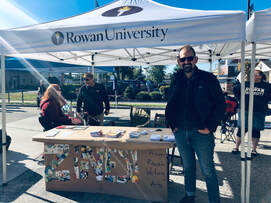 Collingswood held their 17th annual book festival last weekend on October 5th. With book signings, used book sales, kid activities, food vendors, novel-based merchandise, poetry readings and author talks, this was an extensive event with tons of people stopping by over the course of the six hour festival. Even Rowan University’s Writing Arts department got involved by running two booths. One was run by Dr. Jason Luther and students of his new Self Publishing course where they had the opportunity to market their own zines created in the course’s first unit, which Dr. Luther describes as “self-made, usually personal, short run publications, reproduced on a copy machine from a prototype that can be designed any number of ways." The students involved said the event was a “meaningful experience,” in which, “they learned a lot about how to pitch and interact with different folks, from families to teens to boomers to other publishers” and “learned how certain marketing can lead to sales." The students running this booth were not only able to gain this experience of selling their zines, which were all unique about a wide range of topics personal to the authors, but also left the unsold copies at a local coffee shop, which lead to the NJ Pen posting a picture, showing the class how quickly their published work can be shared. 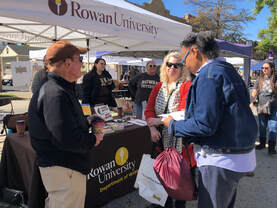 The other Writing Arts booth was run by Stephen Royek, shifts of Writing Arts Faculty members, and Writing Arts interns like myself. This table provided a broader look at Rowan University’s Writing Arts Department. The table displayed published books written by faculty and promoted several department features like the graduate programs, Avant, and the 19th Issue release for Glassworks. It even featured a raffle to win a Rowan baseball cap, t-shirt, and an assortment of books on display. Often, alumni would be drawn to the booth to reconnect with their previous professors, which was a great opportunity to discuss life post graduation and recommend graduate programs and Glassworks submissions. A large percentage of those approaching our booth and entering the raffle during my shift were parents drawn to Peanut Butter & Brains by Joe McGee, Megan Atwood’s Orchard Novel series, or Rodney Robin’s Fabulous Adventure by Doreen Fera, because parents wanted to know how they could get the books for their children. Even though we were not able to sell copies ourselves, people were very interested in how they could purchase the books. Many who approached the table were writers interested in joining our masters program and submitting to Glassworks. One family I spoke with was very curious about my experience in the Writing Arts Department and the internship, information on courses, and how I like the major. Their daughter was interested in pursuing a writing degree at Rowan, so they used the chance to hear about it firsthand. They also excitedly wrote their names down for the raffle and information about some of the books displayed. Later in the afternoon, when I was just browsing the festival, I had the opportunity to run into the same family again. They expressed that our booth was one of their favorites at the festival because of the pitch for our program, the parents told me their daughter is “excited to pursue the program after hearing so much about it." During my time browsing the festival, I stopped by many tables of authors promoting their latest works, several of which I had previously read the novels of. That experience was particularly incredible as I was able to introduce myself and chat with some of the authors I know, receive advice on writing, take their card for updates on upcoming works, and purchase copies that each author signed for me. Aside from tents looking to sell work, many booths were there for an informational purpose much like our Writing Arts Department booth. Two that I found myself drawn to were Book Baby and The South Jersey Writers’ Group. Book Baby is an online publishing company which has been featured several times at Rowan’s Career Expos. I had the chance to discuss my interest in publishing my writing, as well as one day hoping to work as an editor for the company. They were nice enough to give me a few short books on the company and self-publishing, their card with contact info, and a notebook. The South Jersey Writers’ Group gave me their card and notebook as well, and took down my contact information so that I may be informed of their next meeting. The group of writers “meet on the third Thursday of every month for its topic-based discussion and presentation meeting, led by a published author or subject matter expert,” and they “also host several other events each month, including write-ins and critique groups." There is an annual fee of $25 to be a member, the first two months of meetings are free to get a feel for it before committing, and I think at least attending a meeting would be beneficial to any students interested. 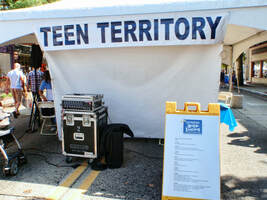 The last and perhaps most personally enlightening experience I had was sitting in on the teen tent "Why Write for Young Adults?" author talk. Young Adult authors discussed their books, opinions on reading and writing education, and stigmas, expressing that children and teens love to read until it becomes a strict homework assignment, which they experienced with their children. One author also made a short speech on the stereotypes surrounding certain books. Addie Thorley, author of An Affair of Poisons, spoke passionately about stereotyping books by associating them with a certain gender, personality type, or other very narrowly defined categories, because it is pushing people away from reading. She also mentions the same in regard to writing, people should write what they want to write, and the audience will find them because the right audience would be looking to read similar writing. She discussed the ways it keeps people, particularly young adults, away from reading when they are put down by peers because of a book’s connotation. She advocates that “People should read and write what they feel drawn to." By limiting the marketing of the book to a specific audience based on stereotypes like gender, ethnicity, class, or even the themes of the writing can be limiting the audience so much that it’s too niche, and keeps potential readers away. This particularly spoke to me as writing very much relies on the rhetorical situation, knowing your audience in order to communicate with them. After her talk, it is easy to see how, rather than just knowing your intended audience and writing for them, authors should also be careful not to write into the limiting stereotypes, so that their work is open to their audience. I found her part in this subject to be the most memorable, and particularly important to the conversation of opening the field of literature to be more welcoming and receive less stigma. The festival had so much to offer on both sides: as someone running a booth and as a book-lover exploring the event. The festival was extensive with a huge turn out where anyone could spend hours immersed in Collingswood’s own little world of literature. The wide variety of stands guaranteed everyone could find a booth to fit their interests, and walk away from the Delaware Valley’s largest festival feeling like they gained something from the experience, whether it be authorial knowledge or a signed copy of a new book. I highly recommend coming out to the 18th Collingswood Book Festival next year, I know I will!
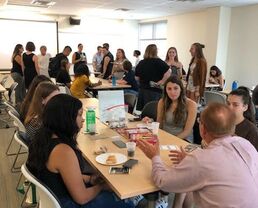 On Wednesday October 2nd, the Writing Arts Department held its first faculty-student meet and greet where students had the opportunity to discuss their academic interests with professors of related programs in a casual environment over refreshments. Many of the students in attendance were new to the department as first semester students taking the Writing Arts Learning Community course, instructed by Professor Amanda Haruch. Professor Haruch explained that the goal of the course “is to foster a community that students are a part of for the duration of their academic career here." The meet and greet expanded this community to include faculty as well, something Professor Haruch hoped would come of the event. These meetings create a more open environment throughout the department where everyone can become more involved as a community and aware of the opportunities offered to them. Professor Jade Jones recounts her experience at the event, “The faculty meet and greet gave us the chance to meet students outside the classroom in a more casual setting. I got to meet students who I may not have in class and I also got to talk to my current students without mentioning grades, readings, or writing assignments. The meet and greet was an opportunity for students and faculty to chat more as peers." This view of faculty and students as peers is the Writing Department goal for both the Writing Arts Learning Community course and future Meet and Greet events, as it provides students with the experience of communicating with peers of their professional field. 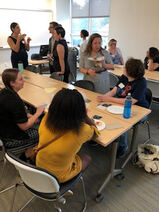 I had the unique experience of interacting with both students and faculty, discussing internship opportunities and my own experience, as well as graduate options for myself as a senior student in the Writing Arts Major. In particular, I had a conversation with Writing Arts Learning Community students who had transferred to Rowan this semester; Daria, a creative writing major interested in publishing, and Champagne who was an Education major with interest in teaching writing. I had the chance to tell Daria about the publishing experience I am gaining through my Writing Arts internship and work with Rowan’s Singularity Press, as we share the same career interests. Champagne and I discussed her goals as a Writing Arts student, and I was able to aid her by peer reviewing some of her writing. 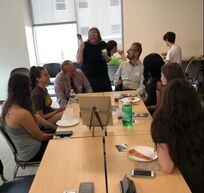 As for faculty interaction, the other students and myself were able to meet and chat with Heather Lanier, a new professor to our department. She discussed the writing subjects she is experienced in, as well as the current courses she is teaching at Rowan. To hear more about her, stay tuned for a podcast interview conducted by Connor Buckmaster, head WA intern and Rowan graduate student. I also spoke with Dr. Grace Fillenwarth and Dr. Jason Luther whom I had met in Intro to Writing Arts. Both teach courses in Technical and Professional Writing, and although my concentration is Creative Writing, they had valuable information and insight to help me with my career goals. I expressed regret that I was unable to take Dr. Luther’s course Self-Publishing, so both professors were able to suggest graduate opportunities and provide contact information that would aid my search for publishing knowledge and experience. After, I had a conversation with Dr. Drew Kopp, chair of the Writing Arts Department, and expressed my gratitude for what I was able to learn about different theories of writing when I had taken How Writers Read with him a previous semester. He later expressed that he was “thrilled with how our first meet and greet went, and it succeeded due to the faculty who led the way: Jade Jones, Amanda Haruch, Megan Atwood, and Heather Lanier, to name a few of the faculty who were there at the meet and greet. However, its success is also due to the students who actually showed up, primarily this year’s Writing Arts Learning Community." The Meet and Greet also served as a chance to discuss upcoming events. Professor Katie Budris passed out flyers and recommended students attend Glassworks’ Issue 19 Launch Reading on October 24th at the High St. Art Gallery, and I was able to discuss plans for Rowan’s involvement in the Collingswood Book Festival with Professor Stephen Royek who ran the Writing Arts booth at the festival and Dr. Luther who ran a booth there for his Self-Publishing course. To hear more about that annual event, be sure to read next week’s article! The last event that the faculty-student meet and greet provided an informational platform for is the “newest winter session opportunity,” the Winter Writing Retreat to the beautiful Pendle Hill retreat center in Wallingford, PA.
Creative Writing Professor Jade Jones held a presentation on what this creative writing retreat, presented and priced as a 1 credit course, has to offer Writing students. She highlighted that herself, Megan Atwood, Lanre Akinsiku, and Heather Lanier will be sharing their creative writing expertise as published faculty. Jones made sure to mention that this writing focused retreat will allow students “the chance to use the January break productively and gain writing tools that’ll help them in the years to come” and later expressed her excitement for the event mentioning that she is “looking forward to exploring multiple creative genres with students in January." If you are interested in the retreat this winter, as Dr. Kopp and Professor Haruch have stated, “While the retreat is primarily for [Writing Arts Learning Community students], other Writing Arts majors are invited to the retreat, though they will need to move fast” because “there are now already eight students from the meet and greet registered to attend!” If you would like to be one of the other twelve students to attend this first retreat, contact Dr. Drew Kopp by email asap. 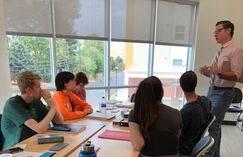 In the end, all of the students and faculty were able to engage in productive conversations that were enlightening to what that Writing Arts Department has to offer students. The main concern expressed across the board for future meet and greets was the hope for more upper-class students to attend as well, not just Freshman. However, Professor Haruch included with this suggestion the notion that “being able to access freshman students and begin to build those bonds so early in their Writing Arts Journey was priceless." Still, more upper-classman participation would ultimately provide freshman students a view of their future as Writing Arts students, and could benefit themselves as I did in learning about their opportunities post-graduation, catching up with their previous professors, and meeting those they never had the opportunity to take courses with. Despite the event including mostly students new to the program, faculty left the event feeling much the same as Dr. Kopp, who was “thrilled with how our first meet and greet went." As a representative of the student viewpoint, I agree with Dr. Kopp that the event was a great success and share the same sentiment as Professor Haruch: “My hope is that this is the first of many faculty and student meet and greets”. |
Archives
May 2024
Categories |
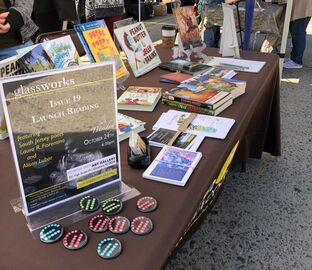
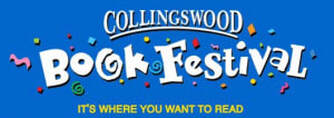
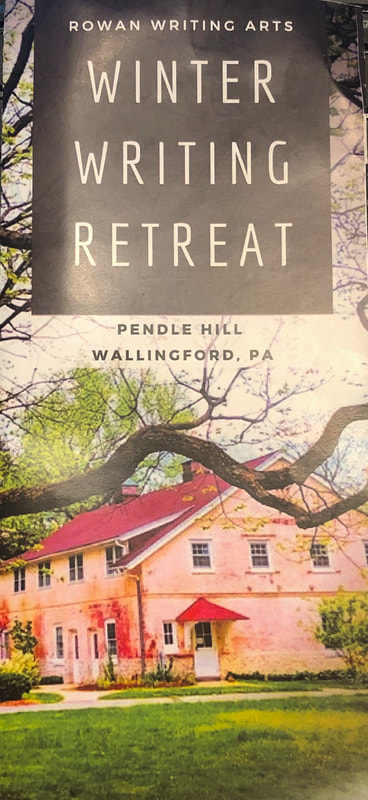
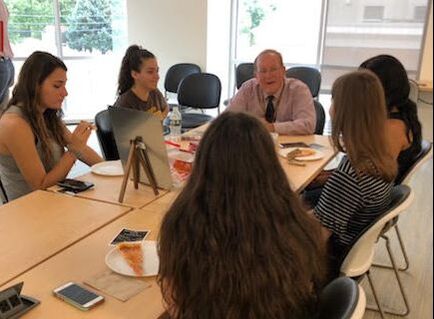
 RSS Feed
RSS Feed